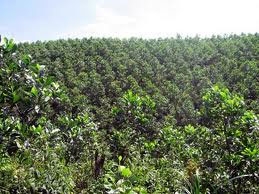Rich capital flows yet to blossom
 |
| illustration photo |
Vietnam Forest Corporation (Vinafor) general director Pham Manh Hien said the firm was the developer of eight key afforestation projects but it was eligible to source state preferred loans in the first seven years of these projects only. Usually, planted forests cannot produce harvests or then bring in profits after seven years, whereas businesses are short of capital for further investment.
Similarly, Van Hung Tea Joint Stock Company director Nguyen Thi Minh said businesses planting tea were accessible to state preferred loans in the first seven years only while it needed several years more for tea fields to bring harvests.
Minh added that as much as VND100 million ($4,830) would be required to plant tea on one hectare of land against previous level of VND60-VND70 million ($3,000-$3,380).
Not only short of capital, many businesses active on woodwork manufacture, sugar, vegetable and fruit production could not recoup investments after spending a huge sum to help farmers develop material growing areas.
“We pumped money into planting forests in northern Hoa Binh province. However, at harvest seasons, farmers sold their products to private traders,” Hien said, adding that under signed contracts local farmers bound to sell over 100,000 cubic metres of lumber to Vinafor, however, contract validity was over but Vinafor could not recoup its investments.
A Viet-Dai Sugar Company representative in central Thanh Hoa province said wearily that unfair act by private traders on its 10,000 hectare material area adversely affected the company’s production.
Businesses viewed prime ministerial Decision 80/2002/QD-TTg dated June 24, 2002 encouraging contract-based consumption of agricultural produce as a good one but according to them concrete sanction measures must be put in place to ensure farmers and businesses property handle their obligations.
In this respect, former head of Ministry of Agriculture and Rural Development’s Department for Cooperative Economy and Rural Development Nguyen Phuong Vy said farmers and businesses were guilty of breaking contracts as farmers had poor sense for contract term obedience while businesses sometimes undervalued farmer products or unilaterally cancelled contracts with farmers in the absence of state sanction measures.
What the stars mean:
★ Poor ★ ★ Promising ★★★ Good ★★★★ Very good ★★★★★ Exceptional
 Tag:
Tag:
Related Contents
Latest News
More News
- Hermes joins Long Thanh cargo terminal development (February 04, 2026 | 15:59)
- SCG enhances production and distribution in Vietnam (February 04, 2026 | 08:00)
- UNIVACCO strengthens Asia expansion with Vietnam facility (February 03, 2026 | 08:00)
- Cai Mep Ha Port project wins approval with $1.95bn investment (February 02, 2026 | 16:17)
- Repositioning Vietnam in Asia’s manufacturing race (February 02, 2026 | 16:00)
- Manufacturing growth remains solid in early 2026 (February 02, 2026 | 15:28)
- Navigating venture capital trends across the continent (February 02, 2026 | 14:00)
- Motivations to achieve high growth (February 02, 2026 | 11:00)
- Capacity and regulations among British areas of expertise in IFCs (February 02, 2026 | 09:09)
- Transition underway in German investment across Vietnam (February 02, 2026 | 08:00)






















 Mobile Version
Mobile Version